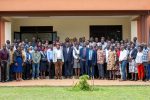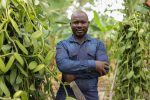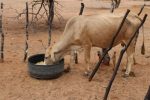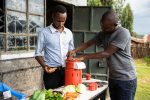RUFORUM amplifies its voice and impact at the Young Africa Works 2025 Dialogue in Uganda series
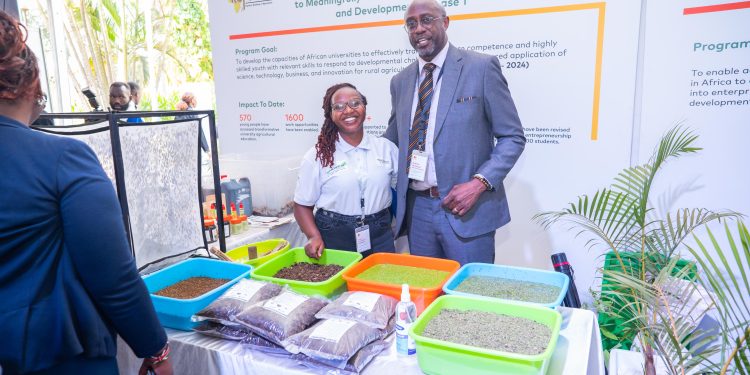
- How can the government create an enabling policy environment to help youth-led entrepreneurship and employment in general?
- How can private sector leaders unlock opportunities and investments for young entrepreneurs?
- How can we as development partners ensure sustainable and scalable interventions?
- How do we break silos and work more collaboratively, leveraging our strengths, knowledge, and resources to create real impact at scale?
During the Young Africa Works 2025 Dialogue Uganda series, focusing on the theme youth-led entrepreneurship as a pathway to dignified and fulfilling work, Mr. Adrian Bukeyna, Country Director for Uganda Programs at Mastercard Foundation, posed these questions in an effort to co-develop solutions and advance entrepreneurship as a viable pathway to sustainable livelihoods and decent work. The event, hosted by the Mastercard Foundation in Kampala from 18 – 19 February 2025, gathered an audience of over 300 people, including youth entrepreneurs, policymakers, government officials, private sector leaders, and development partners. The discussions explored ways to enhance access to finance, resources, and skills to create more opportunities for young entrepreneurs to break the barriers for decent work.
In 2019, the Mastercard Foundation launched the Young Africa Works Strategy in Uganda, which was designed to empower 4.3 million young people between the ages of 18 to 35, targeting 70% women, 7% refugees, and 3% young people with disabilities. This strategy was co-created with the government, private sector, academic institutions, development partners, and young people, building on the groundwork laid by the government. Its goal is to enhance access to affordable financial services, quality education, relevant vocational training, and appropriate business development services, including reasonable technology. Mr. Bukenya highlighted that, “Over the past five years, Young Africa Works has made significant progress, engaging over 3.8 million young people to acquire skills and access finance to start their enterprises. Of these, 1.3 million have transitioned into work”.
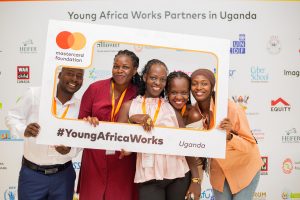
RUFORUM, as a technical partner of the Mastercard Foundation, is leading the way in responding to this year’s dialogue theme. In collaboration with the Mastercard Foundation, RUFORUM is spearheading the Transforming African Agricultural Universities to Meaningfully Contribute to Africa’s Growth and Development phase 2.0 (TAGDev 2.0) project. Building on gains and wins from the TAGDev 1.0 project ended in 2022. This 10-year project (2023-2033) is dedicated to cultivating a new generation of skilled African youth by enhancing the capacities of African universities. The focus is on producing graduates who are equipped to address developmental challenges, utilizing science, technology, business, and innovation to revolutionize sustainable agri-food systems.
To date, the TAGDev programme has supported 567 alumni, harnessing the transformative power of youth to drive economic growth, social advancement and fulfilling jobs. To highlight the project’s impact, Dr. Abigael Otinga, RUFORUM’s Senior Programme Officer for System Strengthening and Operations, delivered a presentation on TAGDev’s innovative approaches to skilling, entrepreneurship, and preparing youth for workplace readiness. The alumni have to date impacted the lives of at least 700,000 persons in across 12 African countries and communities utilizing various social ventures and giveback activities.
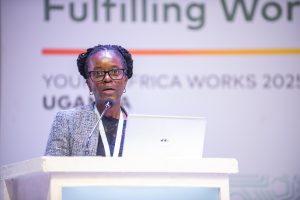 Dr Abigael Otinga, RUFORUM’s Senior Programme Officer for System Strengthening and Operations
Dr Abigael Otinga, RUFORUM’s Senior Programme Officer for System Strengthening and Operations
In a bid to translate words into action, the event featured over 30 emerging entrepreneurs showcasing their products and services, enhancing their visibility and expanding their networks. Among these entrepreneurs was TAGDev alumna Grace Kyarimpa, the Founder and CEO of Agrobiodiverse Solutions Ltd. Her exhibition drew a substantial crowd of intrigued onlookers and buyers. Grace’s enterprise focuses on organic waste management and the creation of sustainable, high-quality, and affordable animal feeds and organic fertilizers. She employs biological resources, such as Black Soldier Fly larvae, earthworms, snails, Azolla, duckweed and moringa to improve livestock nutrition, soil health, and plant growth while advocating for environmental sustainability. Particularly noteworthy is the extraction of snail slime, which is utilized in developing skincare products like soaps and body lotions.
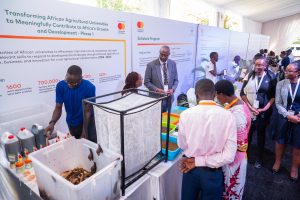 Grace addressing curious buyers on her production process
Grace addressing curious buyers on her production process
Grace’s inspiration stemmed from observing the challenges confronted by smallholder farmers, such as high feed costs and deteriorating soil quality. This led her to pursue sustainable, cost-effective solutions that not only reduce production expenses but also boost animal productivity, enhance soil health, and support local biodiversity. Her objective is to empower farmers, especially the youth and women, to cultivate more resilient, profitable, and sustainable agricultural systems.
The Mastercard Foundation’s Young Africa Works dialogue series is a significant event that brings together influential stakeholders to advance youth employment solutions across the continent. Empowering Africa’s youth is both a moral duty and sustainable essential for securing the continent’s long-term development and economic growth agenda.
At the closing event, TAGDev alumni Adongo Immaculate delivered a compelling speech that elicited emotional responses from the audience. Her address served not only as encouragement but also as a call to action for youth to take charge of their career trajectories in order to achieve dignified and fulfilling careers.
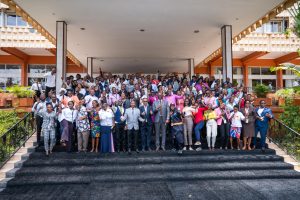
Through initiatives like training, funding, and support, technical partners like RUFORUM are investing in unlocking the immense potential of young Africans. The collective actions taken during the dialogue signify a commitment to fostering an environment where young Africans can realize their full potential.
Keynote Speech from Adongo Immaculate
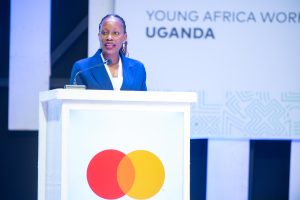
Theme: Youth-Led Entrepreneurship as a Pathway to Dignified and Fulfilling Work
Ladies and gentlemen, all protocol observed
My name is Adongo Immaculate, an entrepreneur, youth advocate, and emerging leader in agricultural development. I am the founder of Fresh Picks Enterprise, a business providing fresh, ready-to-eat fruits and vegetables, and a Youth Ambassador for Real Food Systems, advocating for sustainable food systems.
I hold a bachelor’s degree in Agri-entrepreneurship and Communication Management from Gulu University and am currently pursuing a Master’s in Agricultural Economics at Eduardo Mondlane University. My journey spans from university classrooms to working on innovative irrigation projects that have improved food security and empowered rural communities.
I stand before you today not just as a speaker but as a product of entrepreneurship skilling—someone who once faced the same uncertainties many young Ugandans experience. But I have learned that with the right skills, mindset, and support, young people can create their own futures.
But What happens when ambition meets a dead end?
As we may all know, every year, thousands of young Ugandans graduate full of hope—armed with degrees, diplomas, and certificates. They step out into the world, eager to build their future, believing that education is their ticket to success.
But then reality sets in because the jobs they worked so hard for simply do not exist. This is attributed to the fact that out of the estimated 700,000 individuals who enter the job market annually, only 230,000 which is 34% are absorbed (NPA 2020). Further, employment elasticity for Uganda is low, estimated at 0.04%, indicating that, on average, a percentage point increase in the growth rate of GDP results in the creation of only 400 jobs instead of 10,000 jobs.
But what about the young people who never even made it to graduation Especially the young women who are more likely to drop out due to financial struggles, early marriage, lack of mentors, or the limited exposure early in life (if you compare a child in Kampala who by exposure in primary school are able to say, “I want to be a gynecologist, pilot, doctor among others”. A child in my village in Kalaki, finds it challenging to just mention the word gynecologist. In the village, a child will instead tell you “I want to be a boda-boda cyclist, mechanic” because those are the people they see doing well in their communities.)
Are they doomed to struggle forever?
No, (look at me), they too can create opportunities through entrepreneurship, innovation, and skilling. This can be done only if we change the way we prepare young people for today and the future.
I know this because I was one of those young people, uncertain of what the future held. But my journey took a different turn because: I was equipped with the skills, the mindset, connection, exposure and the confidence to build rather than just seek.
And today, I stand before you to talk about how skilling for entrepreneurship must become the foundation of Uganda’s future—not just for graduates, but for every young person with ambition and potential.
When I joined Gulu University through the RUFORUM TAGDev program, I did not only receive financial support but also gained a new way of thinking. RUFORUM transformed education from a passive experience into an active journey of problem-solving, innovation, and entrepreneurship.
Additionally, rather than focusing on classroom theory, RUFORUM emphasized real-world application by encouraging us to:
✅ Engage with our communities to identify challenges firsthand.
✅ Co-create solutions that addressed real needs, not just hypothetical ones.
✅ Turn ideas into sustainable businesses, instead of waiting for job openings.
This mindset shift was life changing. I saw a simple but significant gap at my university; students lacked access to fresh, ready-to-eat fruits and vegetables. That’s how I founded Fresh Picks Enterprise, a business that provided packaged fresh produce to students.
But starting a business is only half the journey; sustaining it requires a combination of skills and strategy. This is where Gulu University made a difference. Gulu University’s training provided invaluable insights in this regard. We learned the importance of financial literacy, which equipped us with knowledge on how to manage money, budget effectively, and invest wisely. Business development training taught us how to start, scale, and sustain our ventures. Moreover, we focused on community engagement, emphasizing the need to develop solutions collaboratively with the community rather than for them. Finally, we cultivated resilience and adaptability, essential traits for navigating challenges and persevering even when the going gets tough.
Furthermore, RUFORUM, through Gulu University did more than train entrepreneurs, the program empowered us to become changemakers, innovators, and leaders in our communities.
While RUFORUM transformed my life, I recognize that many young people do not have access to higher education, and this does not mean they should be left behind. It should be noted that, some young people drop out of school due to the inability to afford tuition, while others never step into a classroom at all. Additionally, there are those who possess the resources to start a business but lack the necessary skills to run it successfully. It is crucial that we address these disparities and ensure that all young people have the opportunity to thrive.
This is where the RUFORUM approach to train those not in school and not in employment through The Out of School Youth Program becomes important. I personally participated in this exercise during my studies at Gulu University in which together with Sports Outreach Farm, we were able to train young people in piggery poultry, agronomy, and financial literacy.
If we are serious about reducing youth unemployment, we must invest in both formal and informal skilling programs that ensure equal access for both young men and young women. This could be done through,
- Community-based skilling programs train young people who do not have a formal education.
- Apprenticeships and mentorship that provide hands-on training for those who cannot attend school.
- Technology-based learning—such as online courses and mobile training that can reach even those in rural areas.
- Financial literacy training which can empower young people who already have small businesses but struggle to sustain them.
Young people do not lack potential. They lack access to the right skills and opportunities.
The biggest mistake we continue to make as a society is that we train young people to live a world that they are not prepared for and cannot afford. This is because,
- Too many students graduate with knowledge, but not the skills to apply it in real life.
- Too many young people have resources to start businesses, but lack the training to sustain them.
- Too many people think of entrepreneurship as a last resort, instead of the best opportunity.
It’s time to change this. Entrepreneurship training should not be an option but a core part of education.
🚀 We need every school, college, and university to embed skilling for entrepreneurship into their curriculum, so that young people graduate with both knowledge and the practical skills to turn that knowledge into opportunity.
🚀 We also need community-based skilling programs to reach the thousands of young people who have resources but lack the expertise to run successful businesses.
🚀 There is also need to change mindsets, so that young people don’t just wait for opportunities but create them.
The reality is that formal jobs alone cannot absorb the millions of young people entering the workforce each year. But entrepreneurship can expand the opportunities for them.
The next time we gather here, will we still be discussing the problem of youth unemployment or celebrating the rise of a new generation of skilled entrepreneurs?
The choice is ours.



